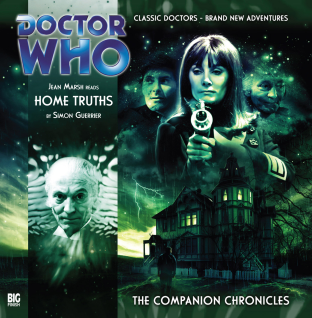The Companion Chronicles
Home Truths

|
|
Big Finish Productions The Companion Chronicles Home Truths |

|
| Written by | Simon Guerrier |  |
| Format | Compact Disc | |
| Released | 2008 |
| Starring Jean Marsh |
| Synopsis: There's a house across the waters at Ely where an old woman tells a strange story. About a kind of night constable called Sara Kingdom. And her friends, the Doctor and Steven. About a journey they made to a young couple's home, and the nightmarish things that were found there. About the follies of youth and selfishness. And the terrible things even the most well-meaning of us can inflict on each other. Hear the old woman's story. Then decide her fate. |
"And the air would not reply" by Neil Clarke 2/11/10
Given the maddening sheer amount of Doctor Who out there, in its various media (TV, novels, audios, comics... all of which takes in various sub-series and spin-offs), I've never really delved into Big Finish's output. However, the Companion Chronicles monologues are a far more attractive use of the audio medium, to my mind, than full-cast plays (Big Finish seems all too mired in their own continuity and interminable returning foes), so it seems like a good place to dip my toes in the water. It's also particularly fascinating to hear a modern approach to the ever-overlooked First Doctor era.
This is only the second one I've listened to, after the atmospheric but not entirely satisfying Frostfire, largely because the return of Sara Kingdom is too good to be true. I've always had a soft spot for Miss Kingdom because, though she isn't exactly Emma Peel (more's the pity), an even vaguely kickass Hartnell companion is gloriously, radically unexpected. Not that this story - a probing psychological character study-cum-ghost story - is quite what you'd expect. Having Sara - of all the companions - developed as a human being is unexpected, to say the least.
Fortunately, it's not a disappointment, thanks to the story's complex use of the monologue format (well, technically, it's a two-hander); it isn't simply a conventional story reduced to being related by one person, like an audiobook. Instead, it's a short story in the form of a dual narrative, with a previous adventure being related in a "present day" section. And, interestingly, it's the present story, rather than the one being related, which is the more interesting and important (though obviously the two strands rely on one another), which has the effect of almost making the story not seem like it is Doctor Who at all; the past story barely has any plot at all (being more an explanation of the present situation), and the Doctor plays very little part.
I really like tangential approaches to Doctor Who stories, and the interwoven duality of the two threads makes Home Truths feel sophisticated and complex, and, despite the simplicity of the story per se, manages to raise intriguing questions very quickly. (Where and when is the present setting, in relation to the story itself? How is Sara alive? Who has killed the couple? What's the deal with the magical house?) Incidentally, it's very odd having a fairytale approach applied to this era; although, to be fair, this is more about the way the story is grounded, rather than its content.
The sound design - ticking clocks, whispering voices, and oppressive, Eraserhead-like rumbles - is impressive (if slightly overdone, though subtlety doesn't seem to be a feature of audio work). Jean Marsh sometimes feels slightly overwrought too, compared to Maureen O'Brien's vaguer, more natural chatting to herself in Frostfire.
However, Home Truths manages not to feel too slight, despite a fairly short running time, and (mainly) one-person narration. It belies this simplicity with a surprising amount of sophistication, and is all the more impressive for going down an unexpected route with regards to Sara, both in terms of her character and the method of her "afterlife" (as opposed to, say, recordings, or a crude sci-fi device like cloning).
I didn't love this story - it feels too spare to be cherished, even though that spareness suits its tone - and it is slightly disappointing not to see Sara in action. But, then, it is churlish to knock such a brave and unusual approach. As director Lisa Bowermen says in the included interview, less-is-more is an overlooked concept these days, so this is something to be lauded, and I'm looking forward to returning to the house in Ely to hear more of Sara's stories in The Drowned World and The Guardian of the Solar System.